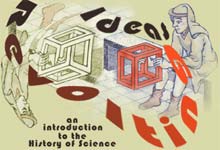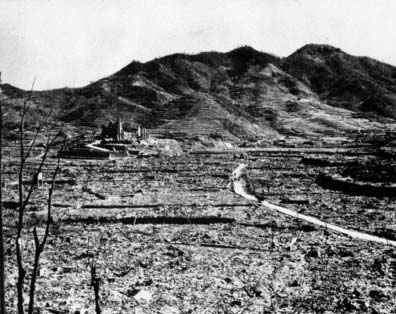
University of California, Irvine
Instructor: Dr. Barbara J. Becker

|
Week 10. New Worldview excerpt from
delivered at MIT on 26 February 1953
|

The shadows behind me were the skeletons of the Mitsubishi factory buildings, pushed backwards and sideways as if by a giant hand. What I had thought to be broken rocks was a concrete power house with its roof punched in. I could now make out the outline of two crumpled gasometers; there was a cold furnace festooned with service pipes; otherwise nothing but cockeyed telegraph poles and loops of wire in a bare waste of ashes. I had blundered into this desolate landscape as instantly as one might wake among the craters of the moon. The moment of recognition when I realized that I was already in Nagasaki is present to me as I write, as vividly as when I lived it. I see the warm night and the meaningless shapes; I can even remember the tune that was coming from the ship. It was a dance tune which had been popular in 1945, and it was called 'Is You Is Or Is You Ain't Ma Baby?'...
The power of science for good and for evil has troubled other minds than ours. We are not here fumbling with a new dilemma; our subject and our fears are as old as the toolmaking civilizations. Men have been killed with weapons before now: what happened at Nagasaki was only more massive (for 40,000 were killed there by a flash which lasted seconds) and more ironical (for the bomb exploded over the main Christian community in Japan). Nothing happened in 1945 except that we changed the scale of our indifference to man; and conscience, in revenge, for an instant became immediate to us. Before this immediacy fades in a sequence of televised atomic tests, let us acknowledge our subject for what it is: civilization face to face with its own implications. The implications are both the industrial slum which Nagasaki was before it was bombed, and the ashy desolation which the bomb made of the slum. And civilization asks of both ruins, 'Is You Is Or Is You Ain't Ma Baby?'
|